There are several herbs that help tackle a UTI. Goldenseal and Oregon grape both contain berberine and other alkaloids that kill bacteria and stimulate the immune system. These herbs also appear to inhibit infection-causing bacteria from adhering to the wall of the bladder, so they are sloughed off in urine.
Though not a garden plant, cranberry is an essential remedy for preventing and treating UTIs. Drink 16-24 ounces per day of unsweetened juice or use capsules.
Another herb, uva ursi, helps to kill bacteria. It possesses a compound called arbutin, which the body converts into a bacteria-killing substance. In Europe, uva ursi is widely used to treat UTIs.
Alkaline urine is necessary for arbutin to be most effective. Drinking large (more than 16 ounces) amounts of cranberry juice can affect the pH of urine and interfere with arbutin. Sometimes it is necessary to take bicarbonate of soda to make the urine alkaline enough for arbutin to work.
Herbs that have diuretic abilities, increasing the amount of urine that passes through the bladder, help wash away bacteria. Hydrangea, parsley, and dandelion leaves are diuretics. Parsley's seeds also contain a substance that is sometimes used to treat UTIs; it also helps reduce inflammation.
Horsetail is an astringent diuretic encouraging urine flow and halting bleeding from the urinary tract.
Marshmallow soothes inflamed areas and enhances immune function to help fight off unwanted bacteria. Mullein also is known for reducing urinary tract inflammation.
The leaves, flowers, and especially the seeds of nasturtium contain natural antibiotics that may be helpful in preventing UTIs. Horseradish root also contains an antibiotic substance along with a good dose of vitamin C, both of which may be helpful in treating this condition.
Vitamins A and C, richly found in the produce from your healing garden, are good for preventing UTIs. The vitamin A, usually in the form of beta-carotene in plants, helps cells form properly and maintains their integrity, making them more resistant to invasion from unfriendly bacteria. Vitamin C not only helps the immune system with production of certain infection-fighters, but in large amounts it can increase urine's acidity. The bacteria that cause this infection do not survive well under acidic conditions, so vitamin C tends to inhibit them.
However, it takes more vitamin C than can be obtained from foods. At least 5,000 mg of this nutrient are needed to significantly acidify the urine; one orange contains about 60 mg.
Do not use goldenseal, Oregon grape, or uva ursi if you are pregnant or nursing. Also, although a UTI may feel better, it's important to proceed cautiously. Unless you are quickly successful with herbal remedies, it's very important to seek medical care promptly.
During and after a UTI, always follow up with a health care provider. Symptoms may disappear, but the infectious bacteria can make its way up to the kidney and cause damage and even death. Only a urinalysis can reveal whether all offending bacteria are out of the entire urinary tract. Always seek medical advice if there is blood in the urine.
